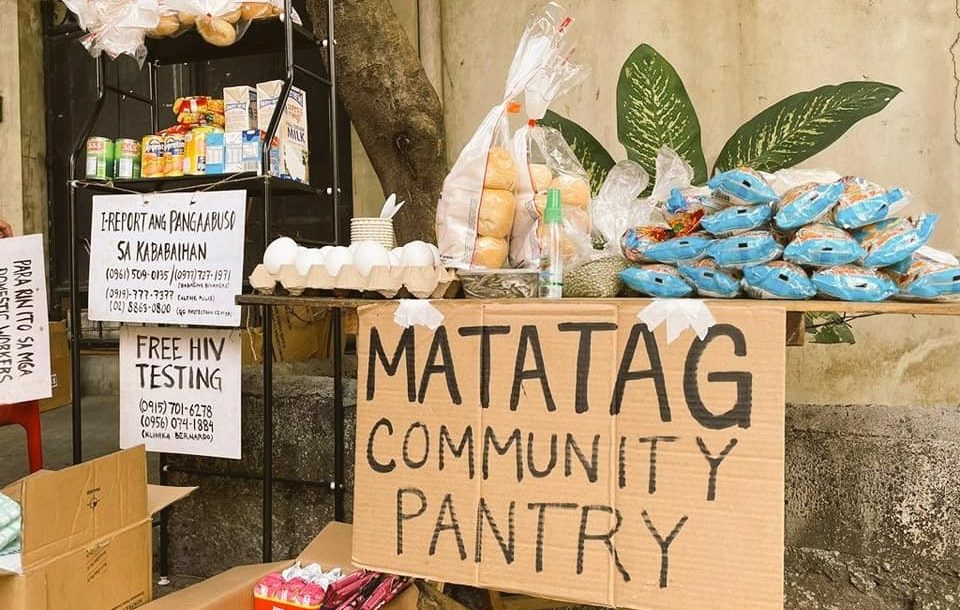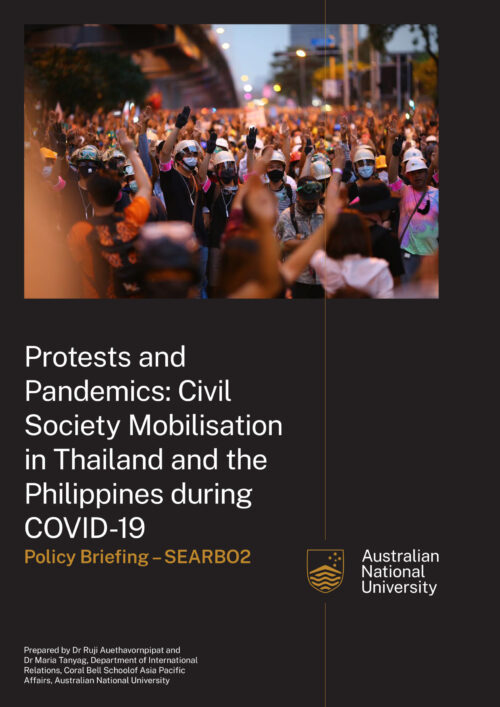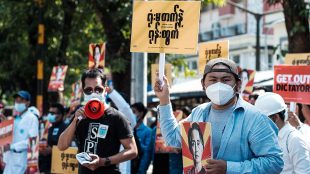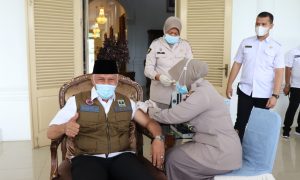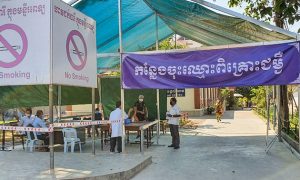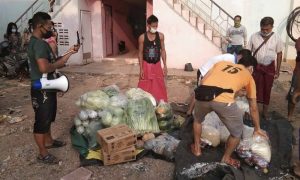COVID-19 has led to the use of emergency powers that shrink civic space globally. Southeast Asia is no exception. Yet, emergency powers have varying effects in controlling the pandemic, and democracy activists and human rights defenders have responded to such constraints differently.
This policy brief draws from two country contexts from Southeast Asia—Thailand and the Philippines—to analyse the influence that emergency powers have in shaping civil society activism. It further compares and contrasts these two countries by highlighting:
- How emergency powers create diverging outcomes in managing the pandemic.
- How civil society activism shapes and is shaped by national pandemic response.
Click on the cover image below to download the full policy brief.
COVID-19 and Emergency Powers
Thailand became the first country outside of China to report COVID-19 on 13 January 2020. By the end of March that year, 60 of 77 provinces had COVID-19 outbreaks. COVID-19 cases remained below 5,000 for the most part in 2020. After this, Thailand recorded two other waves of COVID-10 outbreaks in December 2020 and April 2021. As of July 2021, Thailand has more than 415,000 confirmed cases and 3400 deaths. In comparison to Thailand, the Philippines never experienced waves of outbreak but has seen a continuous surge since the first case was reported on 20 January 2020. As of June 2021, the Philippines has more than 1.2 million confirmed cases and 22,000 deaths.
Just as there is no simple correlation between democracy and good governance, we can no longer draw a straight line between authoritarianism and weak governance.
Civil Society and Southeast Asia’s Authoritarian Turn
To manage the COVID-19 outbreak, Thailand’s Prime Minister Prayut Chan-ocha declared a state of emergency (Emergency Declaration 2020) On 25 March, using Section 5 of the Emergency Decree on Public Administration in Emergency Situation B.E 2548 (2005). This decree came into effect on 26 March 2020, bringing all provinces under the emergency power and transferring authority from Ministers to Prayut himself. In the Philippines, President Rodrigo Duterte signed Proclamation No. 929 on 16 March 2020, which placed the country under a state of calamity for six months due to COVID-19. This specific proclamation allowed the National Government and local government units unprecedented discretion to utilise appropriate funds in their disaster preparedness and response efforts to contain the spread of COVID-19.
Mass Mobilisation during the Pandemic
The key findings highlight varying outcomes that result from the use of emergency powers for national pandemic responses and differences in the opportunities and costs for civil society. Both countries employed emergency measures to address the pandemic. These emergency measures centralised authority and financial resources with the national government. In the case of Thailand, this was effective in managing the spread of COVID-19 in the first outbreak, thereby providing opportunities for citizens to mobilise in street protests. However, in the Philippines, emergency powers centralised authority and resources and, at the same time, allowed the military to become directly involved in the pandemic response. As a result, the pandemic response was harnessed for counterinsurgency and state repression.
Civil society mobilisation is interrelated with pandemic responses in the sense that it provides an important check on emergency powers and helps to provide access to services and information. Civil society mobilisation has pressured the Thai and Philippine governments to improve their pandemic responses but is not shown to translate into policy change or reform when pre-existing civic participation is already constrained and further worsened by the pandemic. In the case of the Philippines, the failing pandemic response has had ambivalent impacts on civil society mobilisation. Strict lockdowns and rising COVID-19 cases disincentivise people from going out in the streets and protesting. There have been cases of online or social media protests but these feed into the already problematic terrain of digital disinformation in the Philippines. Health workers remain on the frontlines of the pandemic and have consistently pressured the government to improve. However, their concerns have been largely ignored by the militarised national COVID-19 task force.
It has been more than one year since the first COVID-19 outbreak and the Philippine government’s pandemic response remains short-sighted and militarised. Paradoxically, this failure is triggering the emergence of new community-driven, “self-help” strategies toward surviving the pandemic underpinned by belief that people cannot rely on help from the government and therefore must weather this crisis on their own. These community-driven initiatives can potentially strengthen civic society and repair societal damages caused by the Duterte administration in the long-run, but also divert attention from the need to improve national pandemic responses.
While differing greatly in political and socio-cultural systems, democracy activists and human rights defenders in both countries have been met by pandemic-intensified state repression. In the Philippines, the government passed the Anti-Terrorism Act in June 2020 while lockdowns were in effect. Despite the UN’s global call for a ceasefire in support for the bigger battle against COVID-19, the Philippine State under Duterte intensified its counter-insurgency and counter-terrorism operations. Red-tagging refers to the labelling of left-leaning individuals and groups as communists and therefore terrorists. The targets of red-tagging, following the same trajectory of the drug war, have broadened beyond the usual suspects of Communists and New People’s Army (NPA) members. In practice, it has expanded to individuals who hold critical views of the Duterte administration. Journalists and academics are also targeted by the government based on unfounded accusations that they are indoctrinating students with leftist ideology and recruiting Communists.
The Philippine case offers an important parallel to understanding ongoing obstacles that democracy activists are facing in Thailand. Since the height of large-scale demonstrations in 2020, pro-democracy movements have been met with increasingly repressive measures, particularly legal prosecution and violent crackdowns, which deliberately instil fear and stifle further activities. Thai Lawyers for Human Rights, an organisation that has provided legal assistance to activists arrested and prosecuted since the May 2014 coup, observed that from the Free Youth protest on 18 July 2020 until the end of May 2021, at least 679 people have been prosecuted for political gatherings and expression. The prosecution of prominent protest leaders and those expressing dissent online is detrimental to both civil society and freedom of expression. In addition to ongoing COVID-19 outbreaks, the combination of these factors puts limits on the possibility of nationwide protests. However, citizens’ grievances towards the government’s haphazard COVID-19 vaccine rollout have revealed the incompetence of the current regime and created a new kind of discontent and opportunities for uniting a broad base of citizens. It therefore remains to be seen whether pro-democracy movements will strengthen after the pandemic is under control again.
Strengthening Civil Society Post-Pandemic
There are important recommendations for policymakers and civil society partners that can be drawn from this research. Comparing Thailand and the Philippines, we find that creating spaces for civil society should be integral to post-pandemic recovery and reconstruction plans. It is clear how the pandemic responses may play into the hands of state violence and repression regardless of whether the response has been effective or limited in managing the spread of the virus.
Consequently, international partners such as Australian decision-makers and transnational advocacy networks should support domestic human rights and democracy activists in advocating for governments to clearly define and assess the temporary enforcement of emergency powers. In addition, regional and international stakeholders can play an integral role in providing support for local organisations and activists to document human rights violations and abuses of power that have occurred in Southeast Asia. In doing so, both international partners and domestic counterparts can place state accountability and long-term prevention of violence as central to post-pandemic recovery plans.
 Facebook
Facebook  Twitter
Twitter  Soundcloud
Soundcloud  Youtube
Youtube  Rss
Rss 